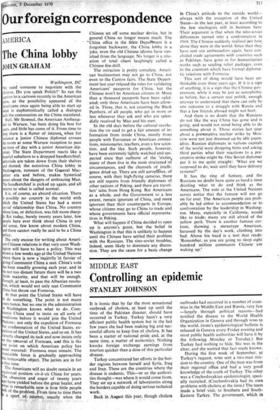MIDDLE EAST
Controlling an epidemic
STANLEY JOHNSON
It is ironic that by far the most sensational - outtsreak of cholera, at least up until the time of the Pakistan disaster, should have occurred in Turkey. Turkey hasn't a very efficient public health system but in the last few years she had been making big and suc- cessful efforts to keep free of cholera. It has been a matter of national pride and, at the same time, a matter of economics. Nothing knocks foreign exchange earnings from tourism quicker than a dose of this particular disease.
Turkey concentrated her efforts in the bor- der regions between herself and Syria, Iraq and Iran. These are the countries where the disease is endemic. This—or so the authori- ties thought—was where it would come from. They set up a network of laboratories along the borders capable of doing serious technical work.
Back in August this year, though cholera outbreaks had occurred in a number of coun- tries in the Middle East and Russia, very few —largely through pcilitical reasons—had notified the disease to the World Health Organization in Geneva and through WHO to the world. (wHo's epidemiological bulletin is released in Geneva every Friday evening and most public health authorities will have it by the followigg Monday or Tuesday.) But Turkey had nothing to hide. She was in the clear, and she wanted that fact made known.
During the first week of September, at Turkey's request, WHO sent a two-man mis- sion to the country. One of the men was from their regional office and had a very good knowledge of the south of Turkey. The other was a Czechoslovakian epidemiologist, speci- ally recruited. (Czechoslovakia had its own problems with cholera-at the time.) The team made a brief visit; to Southern and South- Eastern Turkey. The government, which in
any case had been taking strenuous precau- tionary measures—e.g. with vaccination, chlorination of water supplies, environmental sanitation etc—opened all the doors.
The team found nothing. No evidence of cholera. They visited all the places which appeared to be menaced by infection from neighbouring countries. They did not, how- ever, visit Istanbul.
At the beginning of October, some cases of diarrhoea appeared in Istanbul. Some were treated by doctors, some in hospitals. During the second week of October, the number of cases of diarrhoea reached alarming propor- tions. On 13 and 14 October, the public health authorities went from Ankara to Istanbul and with them went the chief bacteriologist, Dr Alkis, from the Reifik Say- dam Institute in Ankara. Dr Alkis specialised in cholera, had served on a WHO cholera panel and had developed the culture which is named after him. He it was who isolated and identified the Istanbul cholera vibrio, biotype eltor, serotype Inaba.
At the same time, epidemiologists, by plotting the foci of the outbreaks against maps of the city's water system, were able to defermine that there was water-borne trans- mission. The infection had not come from the source of the water itself, but had infiltra- ted into the supply somewhere along the route. Further investigation revealed how. There had, it appeared, been an interruption in the water supply. Pressure within the pipe had dropped with the result that, instead of repelling seepage from outside—as is norm- ally the case when a pipe is under pressure— it had in fact served as a kind of suction device. In this case what the pipe had sucked in had been cholera-infected sewage.
The authorities are reluctant to specify exactly whose sewage it was. They will say only that it is possible that a touring company of players, who had been in Istanbul on their way to Syria earlier in the summer and who had come back to the city on the way home, may have been responsible. The group apparently found the Istanbul hotels too expensive and settled instead in the city's somewhat insalubrious Sagamalcilar- district. The Turkish officials, once they knew what they had on their hands, took vigorous measures. • They vaccinated population around the foci and super-chlorinated the water. They kept a complete record of all movements into and out of the area. And, of course, they treated those who were sick, and probably a good many who weren't sick at all but thought they were, or else were just hop- ing for some free square meals in hospital.
In all, some 474 cases of cholera were registered in Turkey between 13 October and 23 October, with a confirmed diagnosis.
There were forty-six deaths. Today, with the outbreak totally controlled, things are getting back to normal. There has been no surface mail for weeks in or out of Turkey. (Mail could come in but since the Turks had nothing to put in the mail trucks to send back, they soon stopped accepting it.) But at last the trains through Bulgaria are run- ning again.
Cars and trucks are still only permitted through Bulgaria in convoy and the Turkish border with Greece remains cut' off. A WHO man, wanting to leave Istanbul for Rome, had to fly by Ethiopia. Turkish migrant work- ers, bound for West Germany, found the way barred.
Will it happen again? It's hard to say. All one can say is that this autumn's outbreak in Turkey seems to have been more bad luck than anything else,



































































 Previous page
Previous page